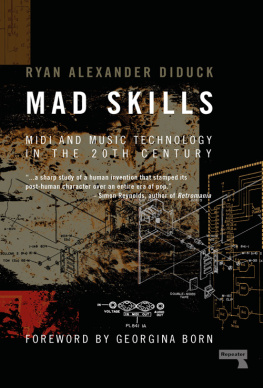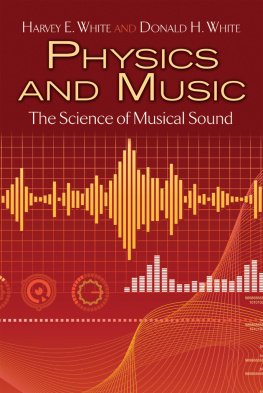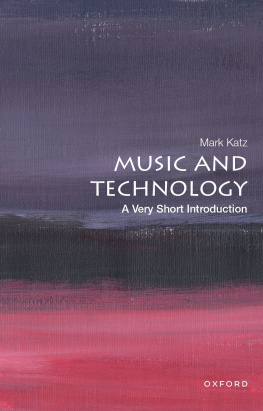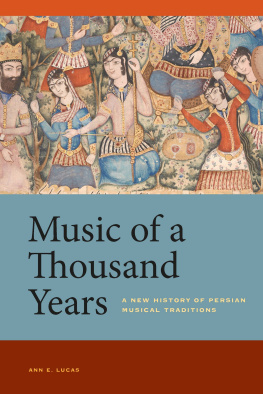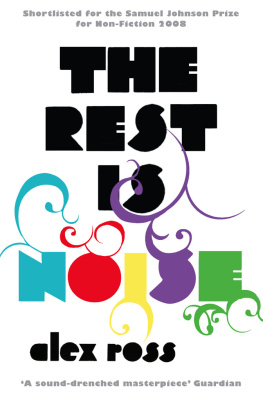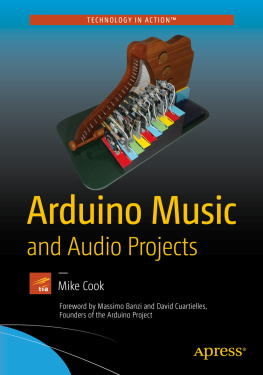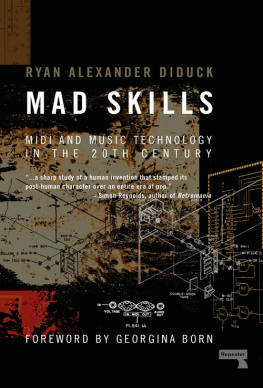MAD SKILLS
MAD SKILLS
MIDI AND MUSIC TECHNOLOGY
IN THE TWENTIETH CENTURY
RYAN ALEXANDER DIDUCK

Contents
Foreword
In this engaging cultural history of MIDI, Ryan Diduck contributes to the growing and lively body of research on music technologies. In so doing he extends the rich and important Canadian tradition of critical intellectual reflection on the history of media. But what kind of history of media technologies do we need and want? Today, many media theorists, in their attempts to hone the object of study, produce histories of media that are more and more pure and monothematic in their epistemic focus and in this sense excessively homogeneous. Effectively, such theorists throw down the gauntlet to the rest of us, declaring: Match us in our intense purity of focus! Diduck adroitly resists the challenge of Theory. If Friedrich Kittler is cited, so too is Genesis P. Orridge and here is the break. For Diducks history of technology is of a different, heterogeneous kind, one that keeps working outwards.
Should the history of music technologies abjure the celebration of linear histories of innovation and these innovations as the works of Great Men? Should it be concerned with culture as more than mere context, and with what this implies in terms of registering both the cultures of technology and the technologies of culture? Might such a history acknowledge politics and if so, where are the politics, and of what kinds? Can it concern itself with the ways in which music technologies are immersed in social processes, while also tracing how they respond to and generate social change? Perhaps most tellingly, should a history of music technologies concern itself with music not just with obvious questions about how particular technologies stimulate musical change, but with less obvious processes such as the ways in which music can portend technological development (think of the musical collages of Charles Ives as they portend the appearance of multitrack mixing and of the sampler)? Diduck responds, rightly, with a resounding yes to these anti-reductionist challenges: this is music-technological history with culture, politics, music, and the social written all the way through.
To extract a compelling instance: Trumps Make America Great Again finds its pre-echo, Diduck shows us, in the mid-nineteenth-century campaign to Make America Musical a campaign in which musical instrument design was inflected by a rising commercially oriented patriotism. Here, gathering ideological movements to foster American national character, infused with the Protestant ethic and ideas of the Melting Pot, were routed through music as the burgeoning piano-manufacturing industry responded to the search for instruments by which to cultivate hard work, individualism and equal opportunity. Pianos, Diduck notes, were the ideal musical machine for the job. The history that emerges, then, is one that weaves between cultures of claviocentrism, the industries and industrial bureaucracies that sprang up to support the triumph of the keyboard, and genealogies of musical automata and of the methods of synchronization on which they depended. This is a re-enlivening of Foucaults genealogy through its transposition into music via MIDIs prehistories.
The bi-directional nature of these historical processes music technologies responding to cultural and social change, while they also engender social and cultural transformation has become a foundational assumption of the best recent scholarship. Yet corners of the historical map have been left untouched, gathering cobwebs through neglect. One such corner, in particular, attracts the torchlight in Diducks account: the politics of the consumer music technology industry, and specifically the institutions charged with regulating the industry. For the MIDI story is a narrative about the ambiguity of these industry bodies, apparently guardians of the public interest yet also ruthless promoters of cartel-like tendencies, as they seek to create and lock down industry-wide technical standards. Through MIDI Diduck shows us the haphazard ways in which such a world-changing technological standard came to be established. As he insists, we should be interested in this history because it has affected the entire ecology of electronic music making since the 1980s. Indeed, how this standard came to be agreed upon, organized, and promoted explains a core layer of the connective infrastructure of music for the past three decades. It is a story with lessons for understanding the interlocking of corporate commercial interests and those millions of musicians who daily deploy MIDI, knowingly and unknowingly, in their musical endeavors.
And this takes us to music and musicians today to the current era in which digital technical skills, imbibed along with mothers milk from infants play with screen interfaces, have become as prevalent as traditional musical literacies, posing urgent questions about the social distribution and the cognitive and aesthetic entailments of those digital skills, as well as the particular historical epistemologies and ontologies of music and sound that underpin them. Here we approach the paradoxes defining our musical times: on the one hand, MIDI has become a channel for the efflorescence of musics production and performance, wedded to its commodification; on the other hand, MIDI has been one of the foremost actants encouraging a different future evident in the flourishing of noncommodified and amateur music practices without limit. To stretch an analogy: if MIDI, at its worst, has come to represent the Silent Spring of music making the strangle-hold of certain digital protocols, protocols that appear to keep the musical garden green and thriving while exacting devastating monocultural hidden costs by virtue of their very universalization and commercialization then, after Mad Skills, we are equipped to move ahead by thinking differently, obliquely.
The complaint invariably made about MIDI as a standard is that it is not flexible enough to meet musicians varied needs: it was made with a particular model of musical practice in mind. Rather than the commercial grip of MIDI, what would it mean for more of the plurality of music-technological protocols that currently flourish to progress into standards, with the potential to embody alternative ontologies and epistemologies of music? Could a diversity of musicians be consulted from the early stages in this process, so that the needs of a wider musical base not just Western popular music are taken fully into account? As opposed to the black-boxing of MIDI, is it possible that in the future these competing and complementary standards could be made transparent and comprehensible, so that the relationship between standards, protocols, and musical affordances becomes more conceptually and musically open and pliable, allowing musico-democratic public debate to contribute to the evolving design of that critical relationship? Can we foresee a future in which a distributed socio-musical intelligence informs key elements of the design of our global music-tech infrastructure?
But relatedly, as Mad Skills shows, we have to ask: where are the alternative institutions publicly oriented, culturally-politically aware, musically responsive, non-profit organizations and design networks required to nurture, invent, and support such a plural music-tech infrastructure? To work against the victory, the historical telos, of MIDI is to peel back the grip of existing mores and to combine efforts at the cutting edge of musical imagination, of technological design, of infrastructural politics, and of the intellection required to interlace these generative critical practices. This valuable book, by virtue of the kind of anti-reductionist history it exemplifies, contributes foundations on which to build these future interlaced practices.
Next page
